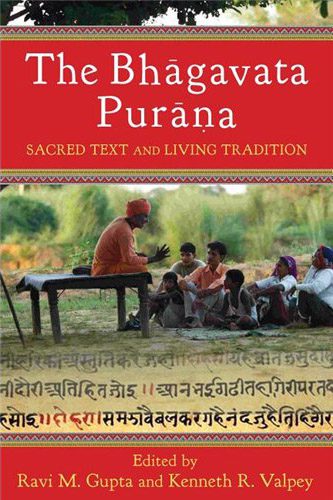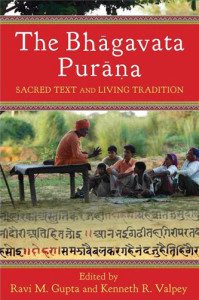New Book Edited by Devotee Scholars
March 21, 2013 (VNN) – By Lillian Stevens via ISKCON News
Ravi M. Gupta, associate professor of religious studies at The College of William & Mary, USA, is working on an abridged English translation of the Bhagavata Purana. Fluent in Hindi, English, and Sanskrit, Gupta grew up in Boise, Idaho, and is known in ISKCON as Radhika Ramana Dasa. He is a major figure in the U.S. Hindu community; in 2998, he was selected to meet with Pope Benedict XVI as a representative of American Hindus. The author of“The Caitanya Vaisnava Vedanta of Jiva Gosvami: When Knowledge Meets Devotion”, he is working with Kenneth R. Valpey (Krsna Ksetra Dasa), a colleague from the Oxford Center for Hindu Studies and the author of “Attending Krishna’s Image”.
Their translation will come out in 2014 and will accompany a new volume of scholarly articles examining the Bhagavata Purana, just published by Columbia University Press. It is entitled“The Bhagavata Purana: Sacred Text and Living Tradition.”Introducing the Bhagavata Purana’s key themes while also examining its extensive influence on Hindu thought and practice, this new collection of essays conducts the first multidimensional reading of the text’s entire twelve volumes.
“The Bhagavata Purana stands out as an important piece of world literature, with some of the most beautiful poetry you’ll find in any language,” says Gupta. “It’s an excellent literary piece in terms of poetic ornamentation, alliteration, and all kinds of innovative Sanskrit verse meters. And it stands out aesthetically in terms of the imagery and stories that are used. There will be an abridged translation covering approximately ten percent of the Bhagavata Purana’s text. The accompanying volume of articles written by different scholars is edited by us, and some of those articles were written by us and other devotee scholars.”
“Kenneth Valpey and I envision a consortium of scholars from around the world who will take up different commentaries from different periods of history and work with them, maybe not to translate all of the commentaries, but to study important areas,” he explains.
Over time, Gupta hopes to undertake an historical analysis of these various periods of Indian history and study how the Bhagavata Purana has interacted with other texts and other cultures as it has migrated to different parts of the world.
From the back cover:
A vibrant example of living literature, the Bhagavata Purana is a versatile Hindu sacred text containing more than 14,000 Sanskrit verses. Finding its present form around the tenth century C.E., the work inspired several major north Indian devotional (bhakti) traditions as well as schools of dance and drama, and continues to permeate popular Hindu art and ritual in both India and the diaspora. Introducing the Bhagavata Purana’s key themes while also examining its extensive influence on Hindu thought and practice, this collection conducts the first multidimensional reading of the text’s entire twelve volumes.
The Bhagavata Purana is a hard-to-classify embodiment of classical Indian cultural, religious, and philosophical thought. Its language and poetic expression are on a par with the best of Sanskrit poetry (kavya), while its narrative structure holds together tightly as a literary work. Its theological message centers on devotion to Krishna and Vishnu, while its philosophical content is grounded solidly in the classical traditions of Vedanta and Samkhya. Each essay in this volume focuses on a key theme of the Bhagavata Purana and its subsequent presence in Hindu dance, music, ritual recitation, and commentary. The authors consider the relationship between the sacred text and the divine image, the text’s metaphysical and cosmological underpinnings, its shaping of Indian culture, and its ongoing relevance to contemporary Indian concerns.
“This book brings together some of the most highly regarded scholars on this subject and cohesively provides an entry into the main themes of The Bhagavata Purana. Moreover, it does so in an interdisciplinary fashion by drawing on materials from the areas of comparative religion, theology, history, anthropology, and ethnomusicology.” — Cynthia Ann Humes, Claremont McKenna College
“The Bhagavata Purana gathers a superb group of contemporary scholars who bring a new dimension of appreciation for this religious masterpiece of Vaisnava Hinduism. Their essays plumb the breadth and depth of the influence of one of the world’s religious masterpieces with its unique devotional intensity and metaphysical subtlety. The vast narratives of the Bhagavata Purana reveal a luxuriant universe in which the divine and created worlds interpenetrate and in which Krishna is portrayed as a God truly to be loved with ‘whole heart, mind, soul, and strength.’ The Bhagavata Purana’s special genius heightens devotional intensity to Krishna while presenting profound theological discourse. No wonder Hinduism in all its varieties cannot be understood without first understanding The Bhagavata Purana. Ravi M. Gupta and Kenneth R. Valpey are to be thanked for gathering these important contributions to its scholarship.” — Daniel P. Sheridan, Saint Joseph’s College of Maine


